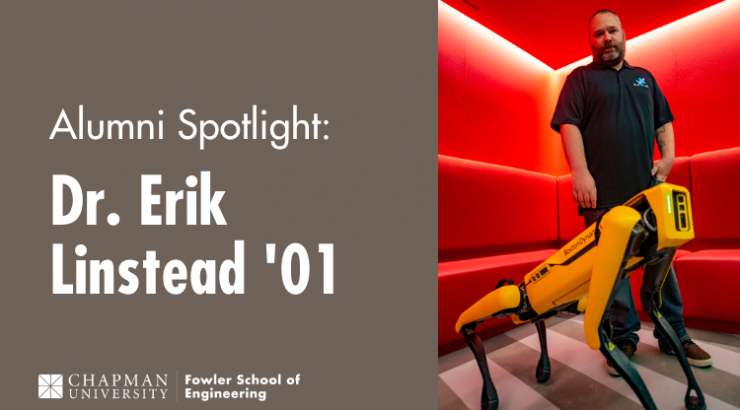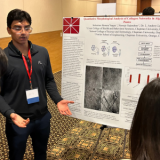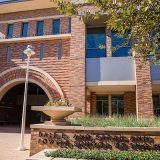
A Legacy of Learning: Highlighting Alumni’s Transition from Chapman Freshman to Faculty Alumni Spotlight: Erik Linstead (‘01)
April 28, 2023
Name: Dr. Erik Linstead
Year: 2001
Major: Computer Science
For Dr. Erik Linstead, Chapman University Class of 2001 alumnus, returning to teach at his alma mater meant giving back to the institution that once provided him with a foundational sense of community and belonging. Throughout his time as an Associate Professor and Associate Dean of Fowler School of Engineering (FSE), Linstead has spearheaded growth opportunities within academic programs to cultivate environments where students, faculty, and friends of the university can thrive together and feel supported. His research takes a human-centered approach, focusing on the application of machine learning and assistive technologies to improve the understanding and treatment of developmental disorders, particularly Autism Spectrum Disorder (ASD).
To conclude this Alumni April series, we spoke with Linstead to discuss his journey from freshman to faculty, gaining insight into the experiences within both industry and academia that brought him back onto Chapman’s campus.
Q&A With Dr. Erik Linstead
Q: What do your day-to-day operations look like as a Professor and Associate Dean here at Fowler School of Engineering (FSE)?
Linstead: The day is always busy: there’s always something to be done, whether it’s working on a paper, responding to comments from reviewers, or meeting with students. I really love being an Associate Dean; I enjoy working on academic programs and figuring out how we can push the School of Engineering forward, whether it’s building new degree programs or thinking about how we improve our reputation. It’s a constant juggling game—and then there’s teaching too, which takes time. I like the fact that every day is a little bit different from the previous day. Being an academic is a pretty blessed existence.

Erik Linstead ’01 with former Chapman president Dr. Jim Doti at his commencement in May 2001. Photo provided by: Dr. Erik Linstead
Q: How would you describe your transition from student to industry professional to Chapman faculty?
Linstead: I completed my undergraduate degree in Computer Science at Chapman and graduated in 2001. The bubble had just burst, so the smart thing to do was to go and hang out in grad school for a couple of years. I went to Stanford for my master’s and as I was finishing, I got a job with Boeing. At almost exactly the same time, I was meeting some friends at Chapman and ran into my former professors, who asked me if I wanted to teach a class. I started teaching and started industry at Boeing at almost exactly the same time, within a couple months of each other. I always knew that I wanted to teach but I never thought I would ever be an academic.
I was at Boeing for twelve years while still teaching, but as time went on, I found myself thinking more and more about how I would rather teach, so Boeing paid for my Ph.D. A long time later, my daughter got diagnosed with autism and I wanted to be able to focus on autism research, so I decided to transition to being an all-in academic. It was a non-traditional path, but I’m glad it was; being in the industry makes me a better professor while teaching helped my presentation and soft skills in a way that paid dividends in the industry. Even though none of it was planned, it was all a happy accident.
Q: What have you found most fulfilling about teaching at your alma mater?
Linstead: I showed up at Chapman in freshman year as an introverted, scared 18-year-old kid who wasn’t comfortable in his own skin and felt a little embarrassed to be the geek from high school. The community at Chapman and within computer science brought me out of my shell by putting me in contact with folks who were like-minded, so I became more confident and comfortable with myself. I think that now if you were to ask my students or coworkers, they would probably say that I’m an extroverted person, and that transition happened here. It’s satisfying now being in a classroom and providing students with the same kind of experience I had as a student: it’s okay to be excited about the things that we’re excited about, it’s okay to geek out about stuff, and it’s okay to be intellectually curious and feel supported in that.
It’s also amazing when you’re sitting at commencement and you see a student walk across the stage and think, “I taught them this class, I taught them that class,” and now they’re going to go be an engineer at Google, Meta, or Boeing. It’s surreal to have students who come in and haven’t found their voice yet and then four years later they’re these confident young people who are going out to push the envelope within science and engineering. It’s a great feeling.
I can’t tell you if at fifteen years I’m still going to be excited about doing academic administration or research, but in those fifteen years, I’m still going to be excited about teaching one hundred percent.
Q: What are the most important technical or people skills you would recommend students work on as they prepare for life after college?
Linstead: I think people skills trump technical skills. In my experience, when I was in the industry, I met brilliant people who were stuck in mid-level roles because they couldn’t talk to others. The first important thing is to become very comfortable communicating technical ideas to non-technical people. Talk to everybody— there’s stuff out there that you’ve never heard or thought of. You never know what path you might find that could put you where you need to be in life. You don’t know who could be an amazing mentor or friend. It’s important to put yourself out there and talk, even though sometimes for a lot of us—especially as engineers—that’s not our natural inclination.
Q: What advice would you give to Fowler students currently searching for job opportunities, particularly those within academia?
Linstead: Be patient and make your own decisions. A lot of people might tell you that if you’re not getting a faculty job at MIT or Stanford then it’s not worth taking one at all. I am very glad to be at an institution like Chapman. You need to listen to that voice in your head that tells you where you’re most excited, you have to find your own happiness and your own fit. That’s the same reason I get questions all the time: “You’ve been at Chapman so long, why haven’t you gone someplace else?” I tell them it’s because I’m happy being where I am.
I feel like I’m making a difference, I like the people I work with, I like the dynamic that I have, and I’m not going to trade that to be at a bigger-name school. Chapman has helped me in my journey. I know what Chapman provided me starting as a young, shy freshman compared to where I am now, and I believe in the way that we do business. So many good things come from just putting yourself out there a little bit.
Lastly, be fearless and never stop learning.
For more information about Dr. Linstead’s research lab and publications, visit his Chapman faculty profile. Those looking to take advantage of career resources are also recommended to check out the official FSE career page or reach out to FSE’s Career Specialist, Samuel Lee.

